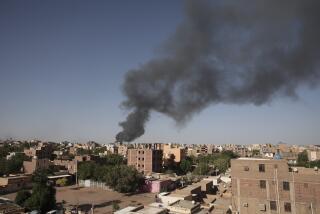Outlook Brightens for Kurdish Refugees : Iraq: But allies may have to stay longer than planned. Diplomats warn of new surprises.
- Share via
ANKARA, Turkey — Optimism is beginning to color analysis of the Kurdish refugee crisis at major Western embassies here, but allied troops may have to remain in northern Iraq far longer than originally planned, diplomatic sources said Wednesday.
A month after more than 2 million mostly Kurdish refugees began their panic flight from Iraq, crisis managers now believe that the elements of a solution are at last falling into place.
Surprise has followed surprise in that month, though, and diplomats caution that continuing uncertainties may produce new ones.
One major imponderable is what the more than 1 million refugees who have fled to Iran are likely to do. The massive U.S.-led rescue and resettlement effort has been directed exclusively toward the nearly half-million refugees in miserable mountain camps along the Iraqi border with Turkey.
There is some feeling that as the mountain refugees return to sanctuaries in Iraq set up by U.S. and allied military forces, the Kurds in Iran--for whom no one has been planning--may suddenly join them in a massive homeward migration of their own.
Also unclear is the pace of the refugee returns, the outcome of peace talks between Kurdish leaders and Iraqi President Saddam Hussein--and whether the United Nations is able to assemble an international force to replace the American, British, French and Dutch combat troops now securing the expanding haven in Iraq.
At issue as well, as the crisis lurches into a second month, is Hussein’s longevity in power. One European ambassador notes that a heretical counter-current is now heard, sotto voce, to the Saddam-be-gone choruses in allied foreign ministries.
Voicing the maxim “Better the devil you know,” the heretics argue that in the long run it will be easier to cope with a weak and poor Hussein--tied as he is to ruinous reparations as a condition for a cease-fire--and easier to demand his compliance to any autonomy agreements he makes with the Kurds than to deal with a successor who is an unknown quantity.
On the positive side in the diplomatic analysis is a sense that the massive allied rescue mission may at last be turning the tide in the mountain camps. There are no good global figures, but strong anecdotal evidence suggests that mortality rates in the camps are dropping quickly, thanks to improved water and sanitation.
Also, the camps are shrinking as refugees decide to return to new camps in flat lands inside Iraq or directly home. By one informed estimate, about 3,000 people have returned to the Iraqi border town of Zakhu alone--many more than have so far moved into a camp on the outskirts of the town.
“The first priority was, is, and will continue to be to get those people off the mountain,” said a Western diplomat. “It is working. There are now patches of mountainside where there is nothing left but garbage and empty tents.”
The refugees, many of them middle-class city dwellers, fled their homes when a Kurdish rebellion against Hussein collapsed in late March under fierce counterattacks from Iraqi forces.
The United States, Britain and France are prodding U.N. Secretary General Javier Perez de Cuellar to get Iraq to agree to a lightly armed international police force as a replacement for the allied troops in the havens.
A major spokesman for the Americans-must-stay school is Turkish President Turgut Ozal, who argues that without a powerful allied presence, the costly and elaborate return of the Kurds to their homes is jeopardized.
More to Read
Sign up for Essential California
The most important California stories and recommendations in your inbox every morning.
You may occasionally receive promotional content from the Los Angeles Times.













